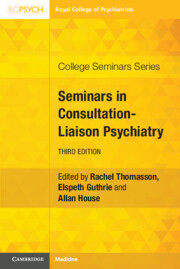Book contents
- Seminars in Consultation-Liaison Psychiatry
- College Seminars Series
- Seminars in Consultation-Liaison Psychiatry
- Copyright page
- Contents
- Contributors
- Chapter 1 The Assessment Process in Consultation-Liaison Psychiatry
- Chapter 2 Notes on Training Pathways in Consultation-Liaison Psychiatry
- Chapter 3 Nursing in Consultation-Liaison Settings
- Chapter 4 Psychological Reaction to Physical Illness
- Chapter 5 Self-Harm and Suicidal Thoughts
- Chapter 6 Depression in Medical Settings
- Chapter 7 Functional Somatic Symptoms
- Chapter 8 Alcohol Misuse
- Chapter 9 Substance Misuse
- Chapter 10 Psychosis in General Hospital Settings
- Chapter 11 Acute Behavioural Disturbance in the General Hospital
- Chapter 12 The Neurology–Psychiatry Interface
- Chapter 13 Perinatal Psychiatry
- Chapter 14 Paediatric Consultation-Liaison Psychiatry
- Chapter 15 Psychological Treatment
- Chapter 16 Legal and Ethical Issues in Consultation-Liaison Psychiatry
- Chapter 17 Social Aspects of Consultation-Liaison Psychiatry
- Chapter 18 Education for Acute Hospital Staff
- Chapter 19 Considerations in the Planning and Delivery of Consultation-Liaison Psychiatry Services
- Chapter 20 Outcome Measurement in Consultation-Liaison Psychiatry
- Chapter 21 The Evidence Base for Consultation-Liaison Psychiatry
- Chapter 22 Primary Care Consultation-Liaison Services
- Chapter 23 Emergency Department Psychiatry
- Chapter 24 Setting Standards for Consultation-Liaison Psychiatry Services
- Chapter 25 Policy to Practice
- Chapter 26 Consultation-Liaison Psychiatry
- Index
- References
Chapter 15 - Psychological Treatment
Published online by Cambridge University Press: 04 January 2024
- Seminars in Consultation-Liaison Psychiatry
- College Seminars Series
- Seminars in Consultation-Liaison Psychiatry
- Copyright page
- Contents
- Contributors
- Chapter 1 The Assessment Process in Consultation-Liaison Psychiatry
- Chapter 2 Notes on Training Pathways in Consultation-Liaison Psychiatry
- Chapter 3 Nursing in Consultation-Liaison Settings
- Chapter 4 Psychological Reaction to Physical Illness
- Chapter 5 Self-Harm and Suicidal Thoughts
- Chapter 6 Depression in Medical Settings
- Chapter 7 Functional Somatic Symptoms
- Chapter 8 Alcohol Misuse
- Chapter 9 Substance Misuse
- Chapter 10 Psychosis in General Hospital Settings
- Chapter 11 Acute Behavioural Disturbance in the General Hospital
- Chapter 12 The Neurology–Psychiatry Interface
- Chapter 13 Perinatal Psychiatry
- Chapter 14 Paediatric Consultation-Liaison Psychiatry
- Chapter 15 Psychological Treatment
- Chapter 16 Legal and Ethical Issues in Consultation-Liaison Psychiatry
- Chapter 17 Social Aspects of Consultation-Liaison Psychiatry
- Chapter 18 Education for Acute Hospital Staff
- Chapter 19 Considerations in the Planning and Delivery of Consultation-Liaison Psychiatry Services
- Chapter 20 Outcome Measurement in Consultation-Liaison Psychiatry
- Chapter 21 The Evidence Base for Consultation-Liaison Psychiatry
- Chapter 22 Primary Care Consultation-Liaison Services
- Chapter 23 Emergency Department Psychiatry
- Chapter 24 Setting Standards for Consultation-Liaison Psychiatry Services
- Chapter 25 Policy to Practice
- Chapter 26 Consultation-Liaison Psychiatry
- Index
- References
Summary
Psychological therapies are used widely in liaison mental health settings to treat individuals with a variety of different mental health problems. The three most common clinical problem areas, however, are persistent physical symptoms (PPS), depression/anxiety associated with physical disease and self-harm. There is a relatively strong evidence base for treatments which target PPS, albeit with certain caveats, whereas the evidence for co-morbid depression/anxiety is quite weak. Psychological treatments for self-harm are discussed in Chapter 5. The most common psychological intervention is cognitive behavioural therapy (CBT), for which there is a large evidence base. There is, however, no clear evidence that CBT is superior to most other bona fide therapies which are currently delivered in a National Health Service (NHS) setting.
- Type
- Chapter
- Information
- Seminars in Consultation-Liaison Psychiatry , pp. 250 - 270Publisher: Cambridge University PressPrint publication year: 2024



